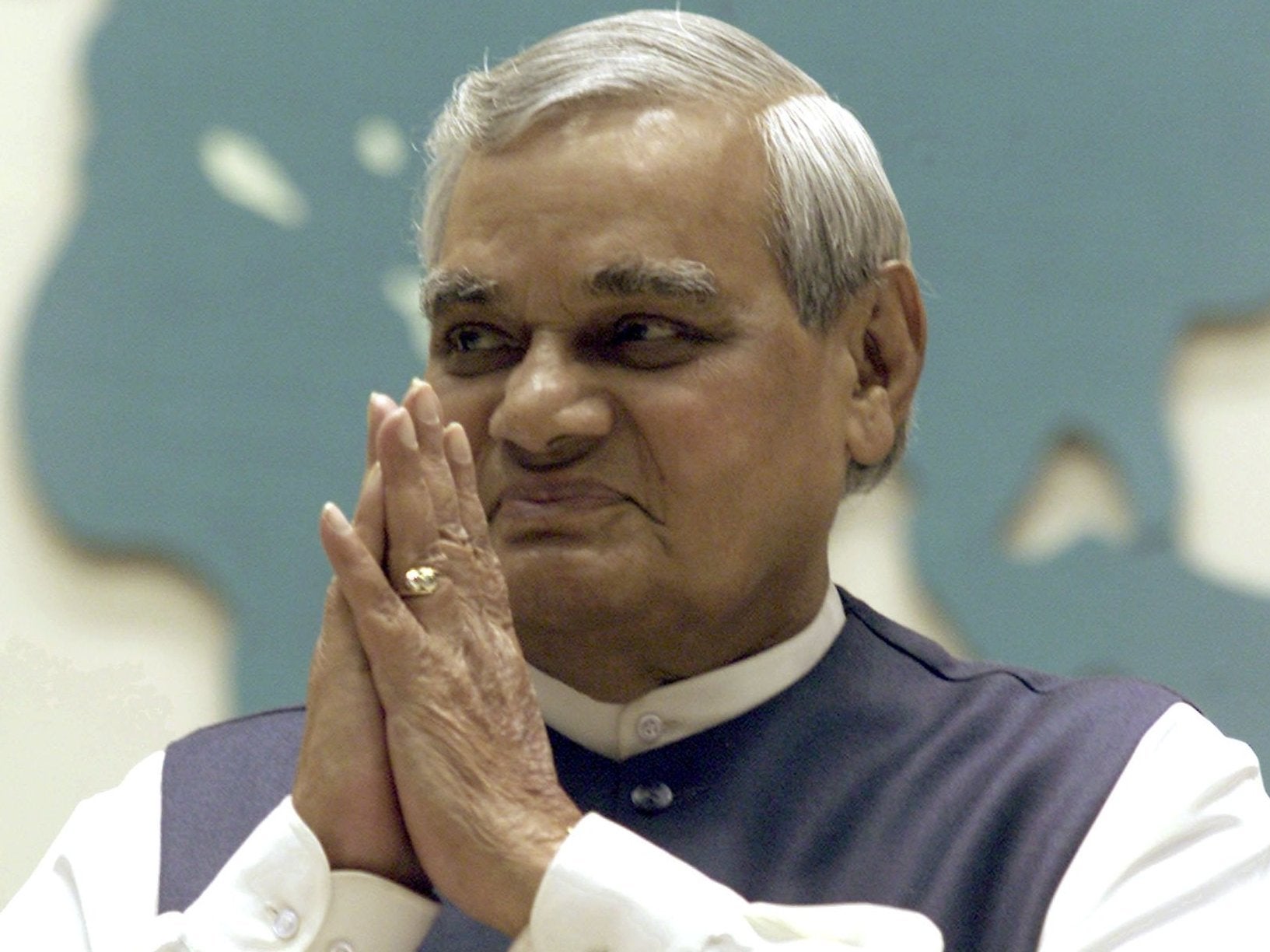Vajpayee death: Three-time Indian prime minister dies at age 93
'Despite the best of efforts, we have lost him today'

Your support helps us to tell the story
From reproductive rights to climate change to Big Tech, The Independent is on the ground when the story is developing. Whether it's investigating the financials of Elon Musk's pro-Trump PAC or producing our latest documentary, 'The A Word', which shines a light on the American women fighting for reproductive rights, we know how important it is to parse out the facts from the messaging.
At such a critical moment in US history, we need reporters on the ground. Your donation allows us to keep sending journalists to speak to both sides of the story.
The Independent is trusted by Americans across the entire political spectrum. And unlike many other quality news outlets, we choose not to lock Americans out of our reporting and analysis with paywalls. We believe quality journalism should be available to everyone, paid for by those who can afford it.
Your support makes all the difference.Former Indian prime minister Atal Behari Vajpayee has died at the age of 93 following a long illness.
The All India Institute of Medical Sciences (AIIMS) announced the death of the former prime minister in a statement on Thursday.
It reads: “It is with profound grief that we inform about the sad demise of Former Prime Minister of India Shri Atal Bihari Vajpayee at 5.05pm on 16.08.2018.
“Shrii Vajpayee was admitted in AIIMS on 11.06.2018 and was stable in the last 9 weeks under a care of a team of AIIMS doctors.
“Unfortunately, his condition deteriorated over the last 36 hours and he was put on life support systems. Despite the best of efforts, we have lost him today."
The statement added: “We join the Nation in mourning this great loss.”
Current prime minister, Narendra Modi, said that his death "marks the end of an era".
The President of India, Ram Nath Kovind, hailed him as a "gentle giant" and a "true Indian statesman".
Vajpayee served as Indian prime minister three times, though once only for 13 days, and once for 11 months. He served just one full term, from 1999 to 2004, but was a member of Indian parliament for over four decades, being elected to the Lok Sabha, the lower house, ten times, and twice to the Rajya Sabha, the upper house.
But it is for India’s relationship with Pakistan while he was in office that his influence was perhaps felt strongest.
During his 11-month premiership, he changed India’s position on its atomic programme which despite being believed to date back to the 1980s Delhi had always insisted was for peaceful purposes.
But within a month of taking the premiership for a second time in 1998,Vajpayee ordered nuclear weapons tests that shocked the world and stoked fears of atomic war with India’s long-time rival.
The move pushed Islamabad to launch its own tests, as the relationship rapidly deteriorated.
But he regained support just months later after Pakistan sent troops across the border through disputed Kashmir, and Vajpayee resisted pressure to launch a counter attack.
After 11 weeks and more than 1,000 deaths, Pakistan ordered the fighters to withdraw.
The restraint earned Vajpayee international praise for his caution.
His peace efforts then began with a groundbreaking bus ride to Lahore, Pakistan, in February 1999, where he met with then-Prime Minister Nawaz Sharif. The diplomatic journey inaugurated the first regular bus service between the two nations.
Then, just before leaving office in 2004, he launched a peace process that, while often rocky, remains the basis of ongoing negotiations.
His actions saw him repeatedly described as a political contradiction.
He was a moderate leader of a Hindu nationalist movement often compared to European fascism, but he was also a lifelong poet who revered nature. "My father," he wrote in 2001, "was a well-known and respected poet... My elder brother also took to writing poetry, and soon I was doing so too."
Despite considerable political differences, he was said to have idolised Jawaharlal Nehru - India’s first prime minister.
"He always had one leg in the other political tradition," a veteran political commentator in India told The Independent in 2002 - during his full term as prime minister.
Nehru, in turn was said to have recognised Vajpayee’s oratory skills and predicted predicted that one day he would rise to high office.
After dabbling in law and journalism, Mr Vajpayee was elected to Parliament in 1957, aged 33.
20 years later he was briefly made foreign minister in an anti-Congress coalition government. During this time he developed the dominant theme of his time in government: improving relations with Pakistan.
It was after this stint that he then became leader of the opposition, which paved his way to the premiership in the late 1990s.
Vajpayee's supporters saw him as a skilled politician. Critics accused him and his party of stoking public fears of India's large Muslim minority.
Despite his numerous contradictions both sides agreed he was that most rare thing in Indian politics: a man untainted by corruption scandals.
Agencies contributed to this report
Join our commenting forum
Join thought-provoking conversations, follow other Independent readers and see their replies
Comments